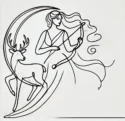The River at Night by Erica Ferencik
Overarching Plot: ⭐️⭐️⭐️/5
Character Development: ⭐️⭐️⭐️⭐️/5
Flow: ⭐️⭐️⭐️/5
Theme: ⭐️⭐️⭐️/5
Writing Style: ⭐️⭐️⭐️/5
Emotional Resonance: ⭐️⭐️⭐️/5
This was a fun story. I feel like I don’t read too many of those anymore. Just one book, not a series, no world building involved. It was less than 300 pages and I read the whole thing in a day.
It was like one of those movies that you watch and at the end you think “yeah, that was fun,” and go on with your day. Then every once in a while you think of it again. We read so little these days that I think there’s this idea that every book has to be revolutionary, something that fully breaks our current way of thinking or seeing the world.
The romance novel industry does a great job of rejecting this. Every once in a while, there’s a story that really breaks through and talks about something bigger than itself, but for the most part, the story is just an escape. A moment to relax, to step away from your life and see how other people deal with their problems.
Now, I should also note that this story is not a romance story. At all. There’s some love life drama. But they also end up having far bigger things to worry about. Maybe that was the point of bringing up the romance in the beginning — to show how different their reality and priorities become so quickly.
To be completely honest, I didn’t expect to like it as much as I did. It was really interesting. It kept surprising me. Not in a ~gasp~ shock kind of way where you have to put the book down. But in the ~oooh~ how are they going to get out of this kind of way.
The author takes her time in setting up the characters intimately, mostly the narrator, to create this connection so that when the drama begins, you either know how they’re going to react, or, more importantly, you know they aren’t going to react well.
Wing was a fascinating narrator. In the beginning, I found her pretty annoying: she whined about how boring her life was, and then spent pages on pages complaining about Pia once she was offered something that wasn’t boring. You can’t have it both ways.
However, once I learned more about her, I admired that in the face of a great deal of personal heartbreak, she was simply trying at all. That’s usually how I respond to real people as well, but in a book it may be better to be a little more up front.
I don’t fully understand why all the friends didn’t just work together to decide on a trip they’d all want to go on, but I guess then we wouldn’t have a story now would we?
One thing I certainly learned from this story: I’ll never go white water rafting. The author’s portrayal of what they had to do and go through was so vivid that I think I’m actually good from ever trying it in real life. Truthfully, it was never something I had planned to do in the first place but now I’ll surely say no if anyone ever brings it up.
What they go through once the rafting experience isn’t what they had planned — and how they’ll survive in the Maine wilderness — is when the story gets really good. It takes turns you would never expect, develops characters in ways that seem to surprise themselves, even takes on some broad sweeping ideals. Though it kind of sweeps over them.
There were times it got quite creepy and I avoided creating the characters in my head because the descriptions of them were freaky enough. Shocking ways the story turned and things that just would never happen, but are so interesting to read.
This was one of those adventure dramas where you can’t help but wonder how you’d handle the situation — and, of course, be sure that you’d handle it better than they did. But also, fingers crossed I never find out.
I don’t have too much more to say about the story, but again, I don’t think that has to be a bad thing. Sometimes a story is just a story. A way to pass the time.
The characters did learn something at the end, though I think Wini’s introspection got a little too expansive and philosophical. It does make sense that her life becomes understood as before the trauma and after. But the afterwards is not that long after.
Pia seemed more realistic. That much trauma and you’re not still struggling? Not still hurting, vividly and maybe visibly? Maybe that’s not fair — people hurt differently — but Wini was a bit messy, a bit of an overthinker the whole time. It doesn’t make too much sense that all of a sudden she’s lost that quality.
Maybe the author wanted a happy ending to a crazy story. For me, it was just a little too clean.

